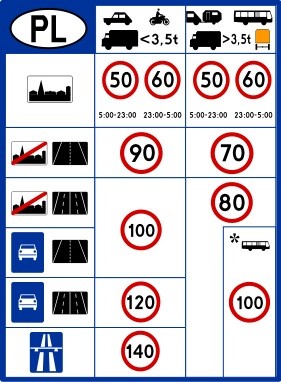
Minnesota speed limits, laws and fines
Content
The following is an overview of the laws, restrictions, and penalties associated with traffic violations in the state of Minnesota.
Speed limits in Minnesota
70 mph: Interstates outside urban areas.
65 mph: urban interstates, urban freeways, and highways.
60 mph: Some highways in the western part of the state.
55 mph: All other highways unless otherwise noted.
30 mph: urban areas and rural residential areas.
10 mph: lanes
School zone speed limits may vary by district.
Minnesota Reasonable and Reasonable Speed Code
The law of maximum speed:
According to Minnesota Motor Vehicle Code Section 169.14, "No one shall operate a motor vehicle at a speed that is more than reasonable and prudent under the circumstances."
Driving with due care: "Every driver is responsible for being aware of the actual and potential hazards that exist on the highway and must exercise due care when driving."
Minimum speed law:
Sections 169.15 and 169.18(10) state:
"No one should drive at such a low speed as to interfere with or block normal and reasonable traffic."
"A person traveling at a slower speed than normal should drive in the right lane available for traffic, or as close as possible to the right curb or edge of the carriageway."
Due to differences in speedometer calibration, tire size, and inaccuracies in speed detection technology, it is rare for an officer to stop a driver for speeding less than five miles. However, technically, any excess can be considered a speed violation, so it is recommended not to go beyond the established limits.
Minnesota has both absolute and superficial speed limit laws. This means that in some cases the driver is allowed to defend his position by claiming that he was driving safely despite exceeding the speed limit. Drivers can also challenge the fine by pleading not guilty on the following grounds:
The driver may object to the determination of the speed. To qualify for this protection, the driver must know how his or her speed was determined and then learn to disprove its accuracy.
The driver may claim that, due to an emergency, the driver violated the speed limit to prevent injury or damage to himself or others.
The driver may report a case of misidentification. If a police officer records a speeding driver and subsequently has to find him again in a traffic jam, it is quite possible that he made a mistake and stopped the wrong car.
Speeding ticket in Minnesota
First-time offenders may:
Be fined up to $300
Suspend license for up to one year
Reckless driving ticket in Minnesota
Driving at 30 mph in excess of the speed limit is automatically considered reckless driving in Minnesota.
First-time offenders may:
Be fined up to $1,000
Be sentenced to up to 90 days in prison
Suspend license for up to one year
Offenders may be required to attend a driving school and this may allow drivers to reduce the fine and/or points awarded on their driver's license.